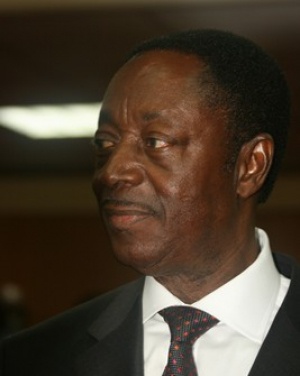...but Fin. Min. reacts
Ghana’s 2012 budget deficit is seen rising above the official target due to elevated spending pressures in the final months of the year.
Ratings agency Standard & Poor’s (S&P) said last week it expects the fiscal deficit to widen to around 7% of GDP from a revised 4% in 2011, adding that spending is likely to have been ramped up by the government because of the closeness of next week’s elections.
The agency confirmed its ‘B’ ratings for Ghana’s long-term and short-term foreign- and local-currency sovereign debt, with a stable outlook. It said the stable outlook balances its expectation of strong real GDP growth and soaring oil-related revenue against persistently large fiscal and external deficits.
The government projected a full-year deficit of GH?4.67billion in its July supplementary budget, a figure equivalent to 6.7% of GDP. But the Bank of Ghana (BoG) has reported that the deficit was GH?5.1 billion for the first three quarters of the year, equivalent to 7.3% of GDP.
Ghana has a record of fiscal indiscipline in election years in the Fourth Republic, characterised by expenditure over-runs and growth in borrowing which often led to an expansion of the budget deficit and distorted the balance of the macro-economy.
Executive Director of the Centre for Policy Analysis (CEPA), Dr. Joe Abbey, who has been leading a civil-society coalition against elections-related fiscal mismanagement, told the B&FT he expects the deficit to be much bigger than S&P’s prediction -- warning of serious consequences in 2013.
“I think they were even fairer to us than the reality suggests. In my view, the deficit will be much bigger than the 7% [of GDP] they are talking about,” he said. “I cannot complain that they kept us where we are,” he added, referring to S&P’s affirmation of its sovereign debt ratings on Ghana.
The BoG, in its monetary-policy committee (MPC) statement that was released on November 14, drew attention to the need for fiscal consolidation at this time of the year; arguing this is necessary to preserve the economy’s resilience against risks to growth and inflation.
Finance Minister Dr. Kwabena Duffuor said in an interview on November 16 that the growth in the deficit during the third quarter of the year is due to the payment of salary arrears of public-sector workers in September and the high cost of domestic debt-servicing -- which has come about through the BoG’s strategy of boosting interest rates on government securities to increase their attractiveness relative to foreign currency assets.
“In September, we paid two months’ salary arrears in addition to the normal monthly salary. But in October it was only one month, so there was a drastic reduction in the wage bill in that month. Also, the interest rates on instruments have started going down; so between now and the end of the year, we expect the pressures to go down and the fiscal situation to improve,” he said.
In a reaction to S&P’s comments on the deficit, Dr. Albert Kofi Asamoa-Baah, Financial Sector Advisor at the Ministry of Finance & Economic Planning, described the concerns over possible fiscal slippage as “unfounded”.
He argued that the economy continues to be stable barely a week to the polls, with the currency appreciating and inflation still within a single digit. He said the deficit, though currently above the 6.7% projection, is within a reasonable band and unlikely to have any adverse impact on the economy.
S&P’s also warned about the rapid build-up of the public debt stock since 2006, when the debt burden was cut down substantially to 26% of GDP after Ghana had benefited from the Multilateral Debt Relief Initiative.
“We believe that comprehensive fiscal consolidation is still to be demonstrated. This is of concern as Ghana’s general government debt stock stands at a relatively high 41% of GDP,” S&P said. BoG data reveal however that the public debt stock hit 44.7% of GDP at the end of September 2012.
Dr. Asamoa-Baah said the debt has been increasing but remains within prudential limits. Belt-tightening approaches
Past episodes of election-year fiscal indiscipline have been followed by relative austerity and belt-tightening in the ensuing year, with damaging consequences for GDP-growth and employment.
“The next fiscal year is going to pose very serious problems,” Dr. Abbey said. Following the blowing-up of the budget hole in 2008, the government -- under the aegis of the International Monetary Fund (IMF) -- began a fiscal stabilisation programme aimed at trimming the deficit, which had hit a record of 8.5% of GDP. In the event, real GDP growth slowed substantially from 8.4% in 2008 to 4% in 2009.
But growth picked up to 8% in 2010 after macroeconomic stability had been restored, and it surged even higher to 14.4% in 2011 -- boosted by oil production from the Jubilee Field. This year, real GDP growth is expected to fall back to around 8%, according to most forecasts.
Business News of Friday, 30 November 2012
Source: thebftonline

















